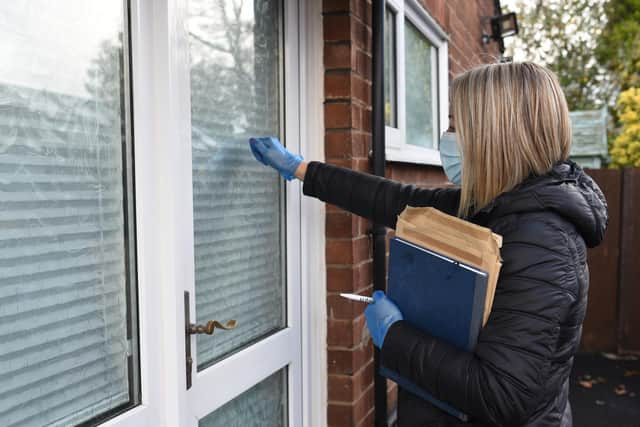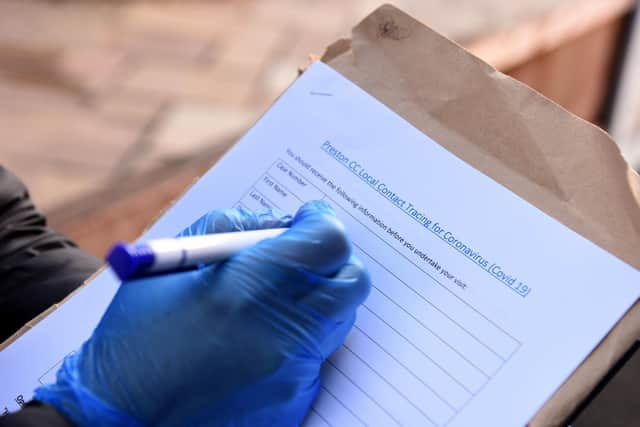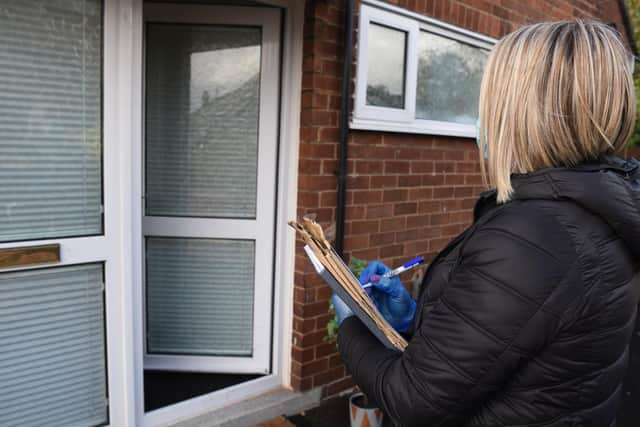How Preston's Covid trackers found hundreds of hidden cases by going door-to-door
and live on Freeview channel 276
The previously elusive Prestonians were pinpointed by local authority staff who contacted them by phone or – in more than 200 cases – turned up on their doorsteps.
Preston City Council was one of the first authorities in Lancashire to obtain local case-tracing powers at the start of September.
Advertisement
Hide AdAdvertisement
Hide AdUnder the arrangement, city-based staff begin to search for any Covid-positive residents who have not been reached by the national system within 24 hours of being notified of their test result.


Attempts will have been made to speak to them directly during that period in order to emphasise the need to self-isolate – and, crucially, to obtain the details of the people with whom they have been in contact.
If that has not proved possible, the local team swings into action – spending the following 48-hours trying to make phone contact and, if that fails, heading to their home address.
Figures shared with the Local Democracy Reporting Service reveal that out of 907 cases so far handed over to the city’s case tracers, contact was made with 659 people who had eluded the national system – a success rate of 73 percent.
Advertisement
Hide AdAdvertisement
Hide AdA total of 479 went on to hand over the details of the people who may be at risk of infection having been in close proximity to them – that equates to around three in every four of those successfully contacted and one in two of those on the overall list of cases to be located.


The local door-knocking team is the final line of defence in ensuring that infected individuals are doing what is now their legal duty by self-isolating – and also in identifying their close contacts so that they can do the same.
Self-isolation is now a legal requirement for anybody who has tested positive or is contacted by NHS Test and Trace and told that they must quarantine after being in contact with a confirmed Covid case.
However, there is no legal obligation for people to hand over the names of their contacts.
Advertisement
Hide AdAdvertisement
Hide AdFaye Murphy – not her real name – leads the city council’s team of half a dozen case-tracers, who have been drafted in from their day jobs with the authority to carry out the work.


She says that there is usually an innocent reason why previous national and local attempts to make contact with Covid-positive residents have failed – leading to a knock at the door.
“A lot of the time, it might be that there is an incorrect digit in the phone number they provided when they booked their test – so they give us the correct one and when we call back later, we get all of their contacts from them with no problem.
“But you do wonder if some people make a number up, because the one they have given is nothing at all like the one it turns out to be.
Advertisement
Hide AdAdvertisement
Hide Ad“There are also a lot of people who say that they don’t answer withheld numbers, which is how the calls from the national and local team display on people’s phones – although we’re looking at altering that for the local system to encourage people to pick up” Faye explains.
However, there is a more steadfast reticence to engage with the local case-tracers among some of those who receive a visit.
Out of the 231 door knocks completed to date, 68 have either pledged to answer a subsequent call to hand over the details of their close contacts and then failed to do so – or have refused to respond to council staff on the doorstep.
“Nobody has immediately slammed the door in my face, but I have had a few who have said, ‘Just leave me alone, I’m not interested’ or ‘I’m sick of hearing from you’.”
Advertisement
Hide AdAdvertisement
Hide Ad“And there is nothing we can do about that, we just have to feed back to the NHS that that was the outcome of our enquiries.
“I always take it as a positive if they’re actually in – because at least then they appear to be self-isolating.”
However, in 60 cases, there has been nobody home when a case-tracer has called – and letters have been left, but not responded to.
In the most serious situations, the police can become involved to enforce the new law on self-isolation if there is concern over the whereabouts of someone who has tested positive.
Advertisement
Hide AdAdvertisement
Hide Ad“We were told that one person we were trying to find was at work in a care home,” Faye recalls.
“The information actually turned out to be incorrect, but within half an hour the police were at that care home to check – and we do have a good relationship with the force.”
In spite of receiving a few cold responses to her cold calls, Faye says that she can sympathise with those who may be irritated to see her or her colleagues at the door.
“Some people are upset or just really poorly.
“Also, a lot of people might genuinely believe they have done the right thing already – perhaps by telling their school or place of work that they have tested positive.
Advertisement
Hide AdAdvertisement
Hide Ad“But we ask them to think about other places that they have been, like a place of worship, for instance.”
A call from a local case-tracer is not designed just to ensure that people are complying with self-isolation – but coping with it, too.
Residents are pointed in the direction of services to help them if they need anything from food parcels to debt advice.
For Faye, that is the “hidden value” of the local system over its national counterpart.
Advertisement
Hide AdAdvertisement
Hide AdHowever, delays in receiving cases from the national system sometimes mean that people are only being contacted by the Preston team close to the point at which their 10-day isolation period is nearly over – and so long after the benefit of tracking down their contacts has been diluted.
Figures cited in a letter from Lancashire council leaders to the government during the recent Tier 3 negotiations show that only 10 percent of cases passed to Preston City Council were received within four days of a positive test – while more than 80 percent did not appear for at least eight days.
Faye says that elements of the local system are also constantly evolving and that Preston is considering whether it would improve engagement if their in-person tracers made their own post-visit follow-up calls immediately from their own cars rather than handing cases back to the town hall call centre for their colleagues to obtain the details of an infected individual’s close contacts.
“Obviously that would take more resources for my team, because we’d be sat outside someone’s house for 20 minutes rather than just making contact and telling them to expect a call later,” Faye explains.
Advertisement
Hide AdAdvertisement
Hide AdWhile she and her colleagues could never have imagined this time last year how their job roles were to be transformed, Faye says that there is a sense of satisfaction from being on the frontline – and the front foot – in the fight against Covid in Preston.
“It’s a difficult task – you have to stand at least two metres away from the door in gloves and with a clipboard and try to have a confidential conversation with someone who might not want to talk to you.
“But in the main, people understand why you’re there and they do co-operate – and we do feel like we’re making a difference.”
‘LET LOCAL TEAMS DO THE LEGWORK’
Throughout the pandemic, there has been a push from councils and public health officials in Lancashire for more local involvement in contact tracing.
Advertisement
Hide AdAdvertisement
Hide AdLocal teams do now take over the search for anybody who has tested positive if they cannot be located by the national test and trace system – with one of the aims being to obtain the details of their close contacts.
However, that is where the local role currently ends – and responsibility for actually tracking down those contacts and telling them to self-isolate is returned to the national service.
Last week, that system – operated by outsourcing firms Serco and Sitel – reached 59.6 percent of contacts nationwide, one of the lowest proportions since the service launched. However, the figure rises to 75.1 percent when considering only those cases were details of contacts were actually provided by the infected individual.
Lancashire’s director of public health, Dr. Sakthi Karunanithi, has previously called for the localisation of all stages of the contact tracing process.
Advertisement
Hide AdAdvertisement
Hide AdThe county has now been given £12m to expand test and trace capacity – along with enforcement of Covid regulations – as part of the financial package from the government for being placed under Tier 3 restrictions.
Dr. Karunanithi told the Post that Lancashire is now in discussion with NHS and Test and Trace about “really integrating the local and national programmes”.
He added: “This will help us provide more person and household-centred care for those testing positive and their contacts.”
Lancashire County Council is currently advertising for an unspecified number of Covid caseworkers and contact tracers on contracts lasting until March 2022.
Advertisement
Hide AdAdvertisement
Hide AdPreston City Council leader Matthew Brown said the work of local case tracers was “impressive” – but that it was only needed because of the “failures of the national outsourced system”.
“We have been asking for a localised test and trace service for some time, especially after Preston became an area of intervention [subject to additional restrictions] on 7th August.
“The public health team at the county council are extremely talented people and know what is needed to effectively tackle the pandemic.
“The infrastructure we have nationally is not working. The government are now giving us bits of things which we can do more efficiently – but it’s too piecemeal and not co-ordinated.
Advertisement
Hide AdAdvertisement
Hide Ad“We have also had to redeploy people from other parts of the council, meaning staff aren’t available for other services,” said Cllr Brown, who added that additional funding for the local test and trace operation may be used to bring in temporary workers to shoulder some of the burden.
A spokesperson for the department of health and social care said that the work of NHS Test and Trace meant that “over one million people who may otherwise have unknowingly spread coronavirus have been contacted and told to isolate”.
They added: “[We are] breaking chains of transmission thanks to local and national teams working hand in glove – and local contract tracing is now live in over 100 local authorities across the country.”
“We provide local authorities with extensive data and work with them to manage local outbreaks and implement public health measures.
Advertisement
Hide AdAdvertisement
Hide Ad“We are reaching the majority of people testing positive and their contacts and are providing tests at an unprecedented scale, with capacity being expanding further to 500,000 tests a day by the end of October.”
It is thanks to our loyal readers that we can continue to provide the trusted news, analysis and insight that matters to you. For unlimited access to our unrivalled local reporting, you can take out a subscription here and help support the work of our dedicated team of reporters.
Comment Guidelines
National World encourages reader discussion on our stories. User feedback, insights and back-and-forth exchanges add a rich layer of context to reporting. Please review our Community Guidelines before commenting.